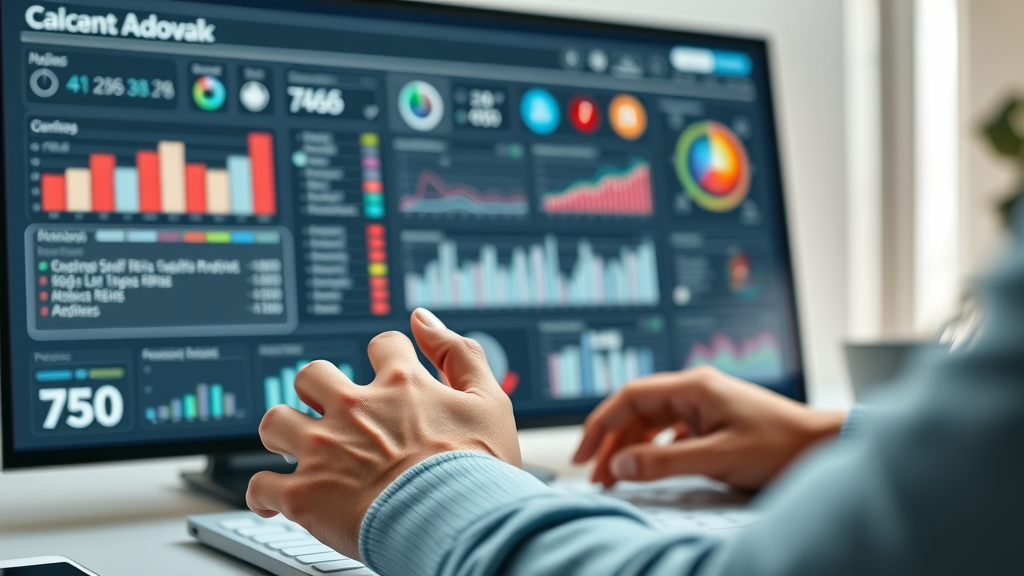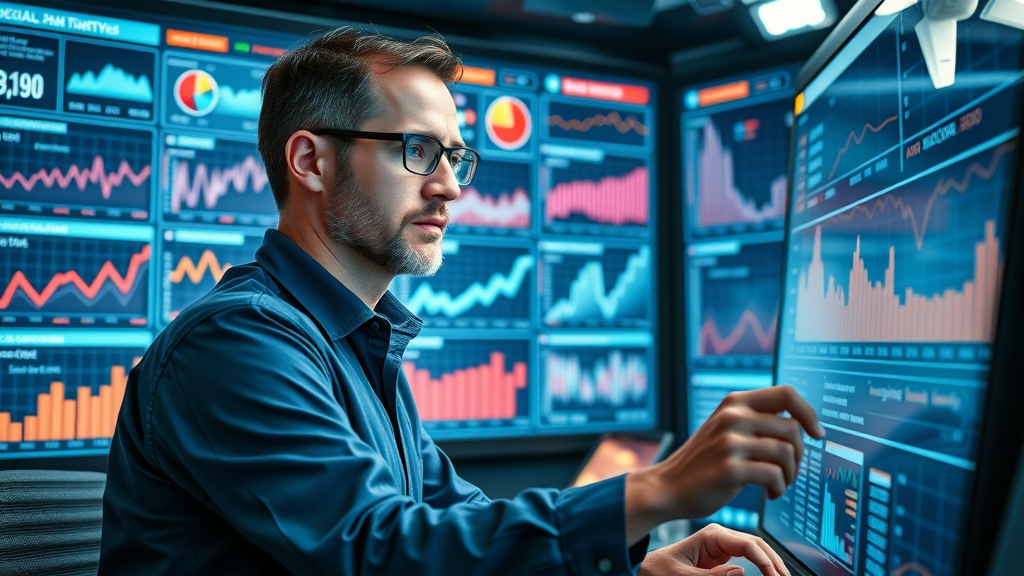Did you know over 70% of marketing leaders say AI adoption will determine competitive advantage within the next two years? That’s just one sign of how AI is affecting marketing trends faster and deeper than ever before. In 2025 and beyond, artificial intelligence is reimagining the very foundation of marketing strategies, customer experiences, and content creation. In this comprehensive guide, you’ll discover how AI is shaping the future of marketing, the essential tools every team needs, and where to focus next for the biggest impact.
Startling Shifts: How AI Is Affecting Marketing Trends in 2025 and Beyond
As we navigate through 2025, the ai market is experiencing a seismic shift as artificial intelligence continues to disrupt traditional marketing practices. AI in marketing is now far more than a futuristic buzzword—it's a necessity for anyone aiming to engage modern consumers and outperform the competition. Marketing teams can no longer rely solely on legacy campaigns and generic messaging. Instead, AI tools are powering new levels of data analysis, trend forecasting, and hyper-personalization, shaping how organizations reach, retain, and inspire their audiences.
Whether you’re a marketing leader, business owner, or creative professional, it’s crucial to understand how AI is affecting marketing trends. You've probably noticed AI-generated content surfacing everywhere, chatbots providing instant responses, and targeted recommendations that seem to read your mind. These aren’t just incremental improvements—they represent a transformational leap forward in marketing strategy. This article unpacks the AI-driven changes you can’t afford to ignore, highlights what’s working right now, and offers industry-backed predictions for the road ahead.

“According to recent studies, over 70% of marketing leaders believe AI adoption will be vital to competitive advantage in the next two years.”
What You’ll Learn: The Impact of AI in Marketing
Understand what AI-driven marketing trends are dominating in 2025
Identify how AI marketing strategies are revolutionizing customer journeys
Learn about leading AI tools and their applications
Explore case studies on AI in the ai market and content creation
Evaluate personalization, generative AI, and the rise of virtual assistants
Defining the AI Market: How AI Is Affecting Marketing Trends Across Industries
ai in marketing: Redefining the Marketing Strategy Landscape
The ai market spans nearly every industry, but its impact is most pronounced in marketing. By leveraging ai tools and platforms, businesses are overhauling their marketing strategies—from audience segmentation to campaign optimization. Traditional methods, characterized by manual segmentation and gut-feel decision-making, are being replaced by AI-driven analytics and automation. AI in marketing enables companies to make data-driven decisions in real-time, minimizing guesswork and maximizing results. The rise of generative ai has also slashed content creation time, enabling agile responses to changing customer preferences and market conditions.
These technologies have made it possible for brands to harness machine learning for everything from trend prediction to personalized experiences. By incorporating artificial intelligence into day-to-day workflows, organizations are redefining their entire marketing strategy—shifting focus from generic messaging to hyper-relevant content that resonates with unique audiences. Ultimately, the AI market’s rapid evolution means that staying ahead demands a willingness to experiment, test new ai tools, and pivot strategy based on data-driven insights.

ai market and the Surge of Artificial Intelligence in Consumer Insights
The explosion of artificial intelligence has fundamentally changed the way marketers gather and interpret consumer insights. By utilizing vast datasets from web analytics, social media, and customer interactions, ai tools can process information at a scale and speed impossible for traditional methods. Marketers now benefit from deep learning algorithms that rapidly analyze sentiment, detect patterns in customer behavior, and anticipate upcoming trends. This surge of AI marketing power equips organizations to predict future purchasing decisions and tailor their messaging at every stage of the customer journey.
Moreover, the global expansion of the ai market has introduced a new level of accessibility. Both large enterprises and small businesses can leverage affordable AI-driven solutions to enhance their understanding of shifting consumer needs. Integrating ai chatbots and advanced data analysis into your strategy isn’t just an advantage anymore—it’s a requirement for maintaining relevance, building trust, and winning loyalty in 2025.
AI Tools That Shape Marketing Trends: Essential Technologies for 2025
ai tool and ai tools for automated content creation
Generative AI and its role in scaling personalized experiences
Chatbots and virtual assistants revolutionizing customer service
Analyzing social media dynamics through AI
Comparative Overview: Top AI Tools in Marketing |
||
AI Tool / Platform |
Main Functions |
Leading Platforms |
|---|---|---|
ChatGPT, Jasper, Copy.ai |
Automated content creation, generative AI, brainstorming |
OpenAI, Jasper, Copy.ai |
HubSpot AI, Salesforce Einstein |
Customer journey mapping, lead scoring, personalization |
HubSpot, Salesforce |
Hootsuite Insights, Brandwatch |
AI-powered social media analytics and sentiment analysis |
Hootsuite, Brandwatch |
Drift, Intercom |
Chatbots, virtual assistants, automated customer service |
Drift, Intercom |
Google Analytics 4 (AI features) |
Predictive analytics, conversion optimization |

Generative AI: Transforming Content Creation and Personalization
How generative ai optimizes marketing strategy and customer journey
Generative AI is rapidly becoming the centerpiece of modern content creation and marketing strategy. It enables marketing teams to produce high-quality, relevant content at scale—essential for cutting through digital noise. These advanced ai tools fuel everything from blog articles and product descriptions to video scripts and social posts, all personalized to audience segments. Beyond just text, generative AI is now generating images, layouts, and even video assets, allowing for complete content generation across multiple channels.
This transformation has a direct impact on the customer journey. Marketers can tailor every touchpoint—from web pages and emails to SMS and chat with personalized experiences. Generative AI ensures the right message reaches the right person at the perfect time, creating seamless, customer-centric journeys that drive conversions and long-term loyalty. In 2024, integrating generative ai into your content generation workflows isn’t just an upgrade—it’s foundational to sustaining a competitive edge.
Examples of content creation with generative ai marketing
Brands of all sizes are already leveraging generative AI for content creation at an unprecedented scale. For example, a fashion retail brand might use AI tools like Jasper or Copy.ai to draft SEO-optimized product descriptions, while a SaaS company employs ChatGPT to generate personalized onboarding guides based on user data. Digital marketing teams use generative ai to craft highly-targeted email drip campaigns, ensuring each interaction feels bespoke rather than automated. AI-generated video scripts and social media creatives are also saving teams hours of repetitive tasks every week.
Additionally, real-world case studies highlight the tangible benefits: some companies report a 50% reduction in content production time and a 30% lift in engagement after adopting generative AI-powered content. This allows brands to consistently test and optimize messaging, pivot quickly to emerging trends, and deliver more relevant content—ultimately yielding better ROI from every marketing campaign.

Customer-First Focus: Personalized Experiences with AI Marketing
Role of AI in enhancing customer experience and retention
Today’s consumers expect highly personalized experiences as a standard. AI in marketing serves as the engine for this new standard, using real-time data analysis and ai tools to deliver fully customized product recommendations, dynamic website content, and smart email campaigns. By understanding user behavior, preferences, and buying signals, AI ensures each customer feels recognized and valued throughout their journey.
In turn, companies adopting personalized experiences report higher retention rates, increased customer satisfaction, and more effective upselling and cross-selling. Through behavior-based segmentation powered by machine learning, businesses can group their audiences according to nuanced criteria, automating campaign delivery and optimizing for long-term loyalty. The result is an experience that adapts in real-time as customer needs evolve.
Personalized product recommendations
Dynamic website content and smart email campaigns
Behavior-based segmentation with ai tools

Virtual Assistants, Chatbots, and the Revolution in AI Customer Service
How chatbots and virtual assistants are reshaping customer journey touchpoints
Chatbots and virtual assistants have gone from novelty to necessity, and they sit at the heart of how AI is affecting marketing trends. These tools provide 24/7 customer service, answer questions instantly, and guide users through complex processes without human intervention. For the customer journey, that means frictionless transitions from exploration to purchase to support—across websites, apps, messaging platforms, and social media.
AI-powered chatbots not only reduce response times but also ensure customers receive accurate, consistent information. They enable businesses to handle higher volumes of inquiries without added headcount, freeing up human agents for complex cases and strategic growth. The combination of ai chatbots and virtual assistants has become indispensable for marketing teams seeking scalable, high-touch, and cost-effective customer engagement.
Real-world case studies: AI customer service transforming the ai market
Consider a global airline that implemented AI-powered chatbots to handle booking queries and real-time support. Within months, customer satisfaction scores rose by 25% and operational costs dropped significantly. Similarly, an e-commerce brand used AI-driven virtual assistants to manage order tracking and returns, unlocking higher retention rates and freeing valuable staff time.
These examples prove that AI marketing technology isn’t just about automation—it’s about delivering a measurable, positive impact on both customer experience and the bottom line. The ai market is full of such success stories, solidifying the role of AI-based customer service solutions in a digital-first world.

Social Media and AI: Analyzing Market Trends and Brand Sentiment
AI in social media: Monitoring, engagement, and social listening
If you want to know how AI is affecting marketing trends on social media, look no further than the explosion of AI-powered analytics and real-time engagement tools. Social listening platforms, powered by machine learning and natural language processing, analyze massive data streams to uncover trends, sentiment, and competitive insights. With AI, brands can react to conversations as they happen and adapt their messaging to fit evolving online dynamics.
What sets AI apart is its ability to predict which social content will resonate, identify micro-audiences, and automate outreach. Advanced ai tools enable persona-driven strategies, allowing for campaign adjustments at the speed of the internet. Through trend prediction and tailored content creation, marketers are achieving higher engagement and more authentic brand sentiment—pushing the boundaries of what's possible in the digital landscape.
Trend prediction with AI analytics
Persona-driven marketing strategies using AI
Before and After: Social Media Performance—AI-Driven vs. Traditional Approaches |
||
Metric |
Traditional Approach |
AI-Driven Approach |
|---|---|---|
Trend Identification Time |
2-4 weeks (manual analysis) |
Instant (real-time AI analysis) |
Audience Segmentation |
Basic (demographics) |
Advanced (behavioral, psychographic) |
Content Personalization |
Limited, manual curation |
Dynamic, automated, data-driven |
Campaign ROI |
Moderate |
High (optimized with machine learning) |

Marketing Strategy Reimagined: Data-Driven Decisions and the Rise of AI-Driven Campaigns
Integrating AI marketing into end-to-end campaign management
The integration of AI in marketing is transforming campaign management from end to end. A/B testing, predictive audience targeting, budget allocation, and even creative optimization can now be managed autonomously by AI tools. Marketers are using platforms that learn from every touchpoint and refine marketing strategy in real time, freeing teams from repetitive tasks and boosting campaign agility.
Centralizing data analysis and campaign optimization within an AI-controlled framework means less guesswork and more measurable impact. Marketing teams can launch, track, and adjust strategies with unprecedented efficiency, reducing waste while amplifying results. Embracing full-scale AI-driven campaign management ensures brands stay agile and able to react to ever-faster market shifts.
Video coming soon: Explainer on integrating AI throughout a full marketing campaign—demonstrating step-by-step processes, tool selection, and data-driven results.
Optimizing ROI: A/B testing, predictive analytics, and budget allocation with AI tools
Achieving optimal ROI from marketing efforts relies on rapid experimentation and deep insights. That’s where AI tools reign supreme—in 2025, automated A/B testing runs continuously, assessing variables like ad creative, landing pages, and timing for the best outcomes. Predictive analytics go beyond simple reports, using machine learning to forecast campaign performance and adjust resource allocation dynamically.
AI-driven budget management tools monitor spend in real time, reallocating funds to high-performing channels automatically. The days of manual campaign tweaks and end-of-month reporting are being eclipsed by full, AI-powered optimization. This new era of ROI management ensures that every marketing dollar is working as hard as possible, cementing AI’s role as an irreplaceable asset for data-driven organizations.
Key Trends and Predictions: The Future of How AI Is Affecting Marketing Trends
Generative ai’s evolving role in content marketing and automation
As we push further into the future, generative ai is set to play an even larger role in content marketing automation. Marketers can expect continued improvements in AI’s capability to craft hyper-personalized, contextually relevant experiences—shaping not only what content is delivered but how and when it reaches every unique consumer.
AI-powered content automation is transitioning from a nice-to-have to an expected standard in both B2B and B2C segments. Expect tools to become more intuitive, creative, and seamlessly integrated across complex marketing ecosystems, enabling marketing teams to focus on strategy while technology handles execution.
AI market projections: What marketers can expect by 2025
By 2025, the AI market will reach unprecedented scale, touching every aspect of marketing, from data analysis and lead generation to campaign personalization and dynamic pricing. Marketing leaders who embrace artificial intelligence will not only meet, but set, new consumer expectations for instant, tailored engagement.
The next frontier will see expanded use of multimodal AI (combining text, voice, image and video inputs), sophisticated virtual assistants, and truly predictive marketing intelligence. The bottom line: brands that fail to embrace AI risk irrelevance in an ever-accelerating digital landscape.
“Marketing leaders must embrace AI or risk falling behind as the technology sets new consumer expectations for instant, tailored interaction.”
FAQ: How AI Is Affecting Marketing Trends
How is AI affecting the marketing industry?
AI is streamlining marketing workflows by automating repetitive tasks, providing richer consumer insights, improving personalization, and enabling real-time customer engagement. Brands leveraging AI marketing see notable increases in campaign efficiency and ROI, as proven by multiple case studies in the ai market.
What is the new AI trend in marketing?
Generative AI models and virtual assistants are at the forefront, allowing for hyper-personalized content creation, predictive lead scoring, and real-time campaign optimization—key markers in how ai is affecting marketing trends.
How does AI analyze market trends?
AI analyzes huge volumes of structured and unstructured data from multiple sources using advanced machine learning and natural language processing. This enables marketers to detect emerging patterns, predict shifts in consumer behavior, and refine marketing strategy in real time, shaping the AI market landscape.
How is AI transforming marketing in 2025?
AI is predicted to drive full-cycle marketing automation, adaptive content creation, and AI-powered customer journey mapping by 2025. With expanding ai tools, marketers will deliver unprecedented experiences and insight-driven strategies.
People Also Ask: Deep Dive into AI Marketing
How is AI affecting the marketing industry?
AI is streamlining marketing workflows by automating repetitive tasks, providing richer consumer insights, improving personalization, and enabling real-time customer engagement. Brands leveraging AI marketing see notable increases in campaign efficiency and ROI, as proven by multiple case studies in the ai market.
What is the new AI trend in marketing?
Generative AI models and virtual assistants are leading the way. These technologies enable hyper-personalized content creation, predictive analytics for lead scoring, and real-time adaptations in marketing strategy. This rapid adoption signals a major shift in how AI is affecting marketing trends across the industry.
How does AI analyze market trends?
AI relies on advanced machine learning and natural language processing to sift through massive quantities of structured and unstructured data. By identifying emerging patterns and predicting changes in consumer sentiment and behavior, AI helps marketers refine their strategies and aim for superior outcomes.
How is AI transforming marketing in 2025?
By 2025, AI will drive fully automated marketing cycles, adaptive content creation, and seamless customer journey mapping. As AI tools become more sophisticated, marketers will create more impactful, data-driven experiences—bringing a new era of efficiency and personalization to the field.
Key Takeaways: How AI Is Affecting Marketing Trends
AI is redefining marketing strategies, content creation, and customer experiences.
Generative AI and advanced AI tools enable real-time data analysis and campaign optimization.
The AI market is expanding rapidly—those who adopt early gain a significant advantage.
Personalization, chatbots, and virtual assistants will shape the next wave of AI marketing innovation.
Conclusion: The Inevitable Evolution of Marketing—How AI Is Affecting Marketing Trends
Artificial intelligence is no longer optional for marketers—it’s the driving force behind every major trend shaping the future. Embrace AI today to ensure your strategies, content, and customer experiences remain relevant and impactful in tomorrow’s fast-evolving digital world.
Ready to Become the Go-To Expert in Your Town? Book Your Free Authority-Building Strategy Call
You're passionate about helping people, but it's hard to make an impact when people can't find you. We'll create a custom content plan that establishes your authority, builds trust, and fills your calendar. Let's map out your path to becoming the market leader in your area.
Book Your Free Authority-Building Strategy Call here
 Add Row
Add Row  Add
Add 




Write A Comment